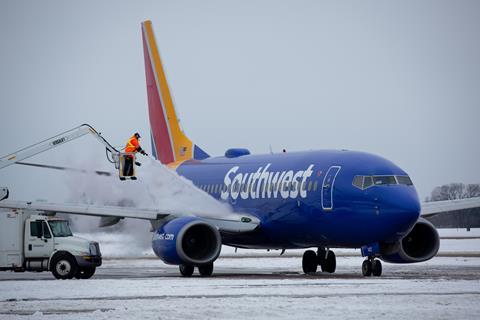A year after overseeing an operational meltdown that disrupted end-of-year travel for millions of Americans, Southwest Airlines once again struggled with weather-related difficulties during the busy winter holiday travel period.
This time, troubles centred around Southwest’s hub at Midway International airport in Chicago. The carrier said it cancelled a nationwide total of 300 flights on 24 December – Christmas eve – and another 100 flights on the holiday itself due to “dense fog” that descended on the Midwest city.
More than 1,300 flights – or 29% of Southwest’s departures – were delayed on 24 December alone. Delays in Denver were a ”byproduct of the delays in Chicago”, the airline said on 26 December.
”Our operation is currently healthy and stable and we do not anticipate any significant disruptions for Tuesday,” it adds. ”We continue to have all-hands on deck as our employees work to safely take care of our customers during this busy holiday travel season.”

Southwest’s struggles were contrasted by relatively routine operations for other major US carrier over the same period. Chicago-headquartered United Airlines delayed 13% of its flights on 24 December but cancellations were minimal.
Midway International airport is Southwest’s fourth-busiest airport in the USA, operating some 200 daily departures, out of a network-wide total of about 4,300 daily flights.
”We are now operating a normal schedule at Chicago Midway and across our network,” Southwest tells FlightGlobal. ”We are fully staffed and all gates are open and fully operating with no additional challenges expected.”
Though more modest in scale, the episode recalls the late-2022 meltdown in which a severe winter storm hit the USA and Southwest’s crew-scheduling system broke down, cancelling nearly 17,000 flights during peak holiday travel.
The carrier issued $600 million in refunds and travel reimbursements to passengers affected by its performance, and it recently reached a $140 million settlement with the US Department of Transportation. The penalty is to be paid as a combination of fines and vouchers for passengers.


























